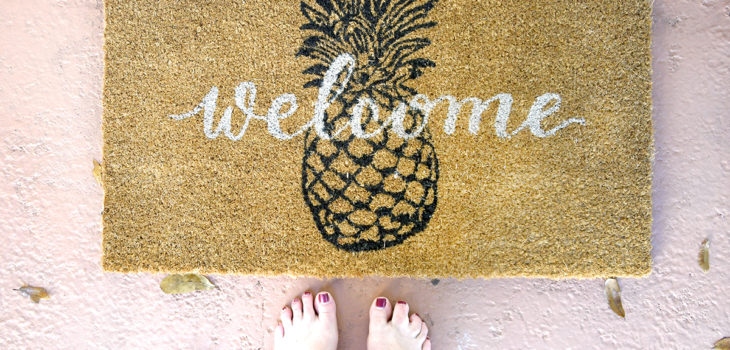 Habits of Hospitality
Habits of Hospitality
Welcome to Pineapple Court
Hospitality (noun): the friendly and generous reception and entertainment of guests, visitors, or strangers.
It’s New Years Day 2019, and I’m writing to you from Longwood, Florida. It’s where my parents have lived for more than 20 years, and where much of my childhood and young adulthood happened.
Every street in this neighborhood is named after a different type of orange, a gentle nod to this plot’s history as a citrus grove. My parent’s house is white with decorative chocolate brown shutters and trim, a rather steep driveway by Florida standards, and a two-car garage that has never housed a car but has served as a rotating hub for our many hobbies. A skinny palm tree waves from the front yard as you cruise into the cul-de-sac. My parents picked this ranch-style abode because it met my mom’s two main criteria: four bedrooms and a pool. It also had a large open living room, which was a non-negotiable for the way this family operated.
The spirit of hospitality still lives here. This house is full of people today, and you know, hospitality is all about people.
What is Hospitality
Hospitality begins and ends with the care of people. Its simple goal is to make people feel good. Comfortable. Safe. Special.
At its most basic, hospitality offers a chance at survival for a person lacking food, clothing, or shelter. It’s an open couch and hot meal for a weary traveler. It’s sharing your water in the desert.
At its most extravagant, hospitality is a way to bring the greatest possible honor to a significant person or event, like a wedding or a coronation banquet for a king. In the middle of those examples lies most of our daily lives, where opportunities abound to celebrate, appreciate and share life together.
I mean it when I say opportunities abound. I want to help you see them. Every time we eat or drink, there is an opportunity to practice hospitality. Every time we come in contact with another person, that’s an opportunity to pause and create a space to exchange hospitable words. Your child got a better grade in English this week, so the family can celebrate with a high five or a treat. The weather’s nice, so go enjoy a walk for twenty minutes with another soul. Have people over because it’s Tuesday!
When you ask someone to join you even in small things, you are welcoming them into your world. You are practicing hospitality.
The Three Elements of Hospitality
There are three words you’re going to find all over the place at The Welcome Cat, because these three words embody just about everything we’re going to talk about.
And they are:
Mindset, Space, and Habits.
Mindset refers to our attitudes about every aspect of hospitality. Our attitudes about people in general, or about specific people. Mindset includes how we approach the work of hospitality, our attitudes about chores and the burdens or inconveniences we take upon ourselves to bring joy to others. Mindset is where we train ourselves to set goals and keep our focus on serving others. Mindset is the most important and most powerful tool we have to make people feel good.
The Space of hospitality is the physical environment we create for people. It includes furniture and light sources. It also includes smells, food and drink, gifts, temperature, toiletries…all the “stuff.” This part is going to be especially fun, because in The Welcome Cat world, you don’t have to be an amazing cook or interior decorator to be wildly successful here. There are some basics to know and understand, and the rest is completely subject to your own taste and available resources. You’ll find so often that in the Space category, less is more, especially when Mindset and Habits are going strong.
The Habits of hospitality are the intentional things we say and do to make people feel comfortable. These can be very different in different cultures, but the important thing here is that some effort is made, because people can tell when we’re trying! Habits include manners. Saying please and thank you and offering a hug or a handshake. Habits include communication skills, like eye contact, attentive listening, and contributing meaningfully to conversation. Habits include awareness and anticipation of needs, like offering direction to the bathroom or to where a person is welcome to smoke.
What Hospitality is Not
There are some things I intentionally don’t include in The Welcome Cat definition of hospitality. Here, hospitality is not about impressing people. It’s about serving people. Here, hospitality is not schmoozing. It’s giving rest.
I’m also not talking about the business of hospitality. The objective of hotels and restaurants is to make a profit, and the best ones do that by using the principles of hospitality to give their customers great experiences. I love to experience their hospitality and I gladly leave my dollars at their doors! But here, we talk about hospitality that does not seek something in return.
Finally, hospitality is not limited to a certain time or place. It can happen at home, at work, or on the street. It can happen over a year or in a moment passing by.
Basic Hospitality
There are five things you can always do to make people feel welcome, no matter where you are or what you have. Here are the five things:
- Give A Warm Greeting
- Provide Nourishment / Share what you have
- Don’t Apologize for what you have
- Give Your Full Attention
- Be thankful for the Time
To improve your human interactions immediately, take this list at face value and just do it. To get more details about how and why it works, read on.
Have you had experiences about what I’m talking about? Are you thinking about specific topics you hope will pop up sooner rather than later at The Welcome Cat? Please leave a comment!
I’m so glad you’re here! Stay awhile.

Hannah Tomlinson
ps. If you’re wondering why I chose the cat as a symbol of hospitality, here’s your post: Why the Cat?